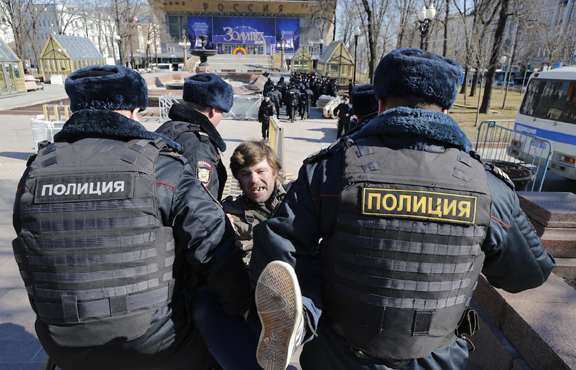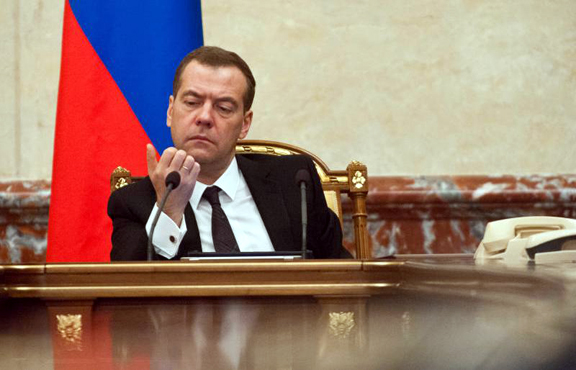Are Russian Teens Really About to Storm the Kremlin? - themoscowtimes.com
Hundreds Arrested as Anti-Corruption Protests Sweep Russia

Recent anti-corruption rallies will go down as Russia’s most youthful protests. When 12-year-old Gleb took to the stage at an anti-corruption protest in the Siberian city of Tomsk last week, few in the audience would have expected the moment to go viral.
“It doesn’t matter who’s in power — Putin or Navalny,” Gleb said to rounds of applause. “The most important thing is to change the system — the government system, education system and healthcare system.”
Although Gleb’s speech immediately made headlines and scored almost one million views online, he wasn’t the only adolescent to take to the streets in a wave of anti-corruption demonstrations that swept Russia on March 26.

By chanting, giving speeches, climbing lamp posts and being detained by the police, Russian youth became the face of the anti-corruption movement across Russia last week.
Kremlin spokesman Dmitry Peskov dismissed the youth participation, saying that opposition groups encouraged children protest with the promise of “financial rewards” — a reference to Alexei Navalny’s promise to help detainees win compensation at the European Court of Human Rights.
In the wake of the protests, pundits disagree on how this youth activity is changing Russia’s political landscape — if it is at all. Some paint the high-schoolers as a fearless new force backing Alexei Navalny, the Kremlin’s main challenger in the 2018 presidential elections. Others argue they are a natural part of growing dissent.
“Younger people — high-school students included — have participated in protests before,” Denis Volkov, a sociologist from the independent Levada Center pollster, told The Moscow Times. “They were there with Navalny on Chistye Prudy in 2011, they actually started the Occupy Abai protest in 2012, and they actively attended the Nemtsov march.”
‘Corruption is everywhere’
Because most of the rallies were unauthorized, it is almost impossible to tell how many attended — not to mention how many of the protesters were teenagers.
The Moscow Times’ analysis of online groups devoted to the rallies (set up by Navalny’s supporters) shows that on average 16 percent of group members were 18 and younger.
Nonetheless, teenagers found themselves in the spotlight. Mass arrests in Moscow, says sociologist Ella Paneyakh, contributed to that.
“The police deliberately picked minors from the crowd — unlike in 2011-12, when they were afraid of eliciting public outrage,” Paneyakh told The Moscow Times. “Now they’re not bound by this fear, so they target those who are most vulnerable, weak and easily intimidated.”
Even at early ages, Russia’s younger generation — less easily influenced by propaganda — sees how state policy impinges upon their privacy and dignity, says Paneyakh. By the time they finish high school, they are fed up with state interference.
Navalny’s anti-corruption film served as a trigger, and this is why they’ve taken to the streets.
Volkov from the Levada Center echoes her sentiment: “People are starting to feel the pinch in Russia. Living conditions are worsening, so everyone — not just the young — are becoming more vocal about their concerns. We expect protest activity to grow.”
Corruption is everywhere in Russia
“Corruption is everywhere,” says 18-year-old Nastya, a protester from the Far Eastern city of Vladivostok. “They take bribes in universities and expect them in hospitals. [State television] says that things are great, when in reality people barely survive on their 20,000-ruble incomes!”
Eighteen-year-old Olesya, who attended the rally in Moscow, agrees. “Pensioners are begging for money in the streets, while [Russian Prime Minister Dmitry Medvedev] is skiing and enjoying exquisite wine.”
Others, like 17-year-old Leonid, who protested in Yekaterinburg, have seen the system from the inside and are frustrated by corruption. “My uncle works in social services,” Leonid said. “He told me how they voted for United Russia because they were ordered to.”
For 14-year-old Dmitry from Novosibirsk, it was censorship and propaganda that drove young people to the rallies. “The [authorities] have ‘broken into’ the Internet and have started bossing us around there — just like they do in every other sphere,” Dmitry told The Moscow Times.
“We don’t watch television, because propaganda dominates there,” Dmitry said. “We use the Internet. But [the authorities] at some point started saying that we can’t write about this and are not allowed to talk about that. That’s why young people took to the streets: They have nowhere else to speak up.”
For others, it was about unity. “Today, the regime is trying very hard to paint the opposition as some freakish minority,” says Pyotr, an 18-year-old student who protested in St. Petersburg. “They repeat this over and over again. It’s really easy to believe that you’re all alone, that you’re this freakish minority.”
“Rallies help us remind ourselves and the authorities that Russia is not just them and the Kremlin’s supporters — It’s us, too. You can feel it when thousands of people around you chant slogans you agree with.”
The fear of being arrested didn’t stop Leonid from protesting.“I figured they can’t arrest everyone,” he says. But one teenager who was detained in Moscow said he would “think twice” before demonstrating again.
“It wasn’t fun at all,” 17-year-old-Denis told The Moscow Times. “They grabbed me by the hood, ripped the poster out of my hands and dragged me into the van. I wouldn’t want to relive this experience.”
Another Moscow protester who spent several hours in police detention, 17-year-old Alexander, disagrees: “It only boosted my desire to protest.”
The big picture
Teenagers polled by The Moscow Times say that they were inspired by Navalny’s films about corruption in the Kremlin’s highest echelons. This is not surprising, says Volkov from Levada: young people are Navalny’s target audience, and he’s doing a good job engaging them.
“His team is working on expanding their audience and setting up dialogue with youth.” he says. “Other political forces are not even trying.”
But not everyone who participated in the protests is ready to throw their weight behind Navalny. “He’s not the leader I’m ready to follow,” says Leonid, who questions Navalny’s experience. Dmitry from Novosibirsk echoes this skepticism: “I don’t know anything about his experience governing.” He adds that he’d vote for him because “who else is out there?”
Medvedev Is Out: Anti-Corruption Protests Cost Russia's Prime Minister his Future

Analysts suggest the protest generally undermines the Kremlin’s narrative of “stability” and the ruling elite’s electoral platform. The fact that many young people who took to the streets on March 26 will be of voting age next year will be a concern for Russian authorities, who are anxious to ensure a decent voting turnout in 2018, says political analyst Yekaterina Schulmann.
“After the 2016 Duma elections it became clear that residents of big cities, ethnically Russian regions and young people don’t show up to vote. So [the Kremlin] is going to have to fight to get people to come to the voting booths.”
“The question is not how people would vote, but whether they will vote at all,” she says.
David Kharebov contributed reporting |




